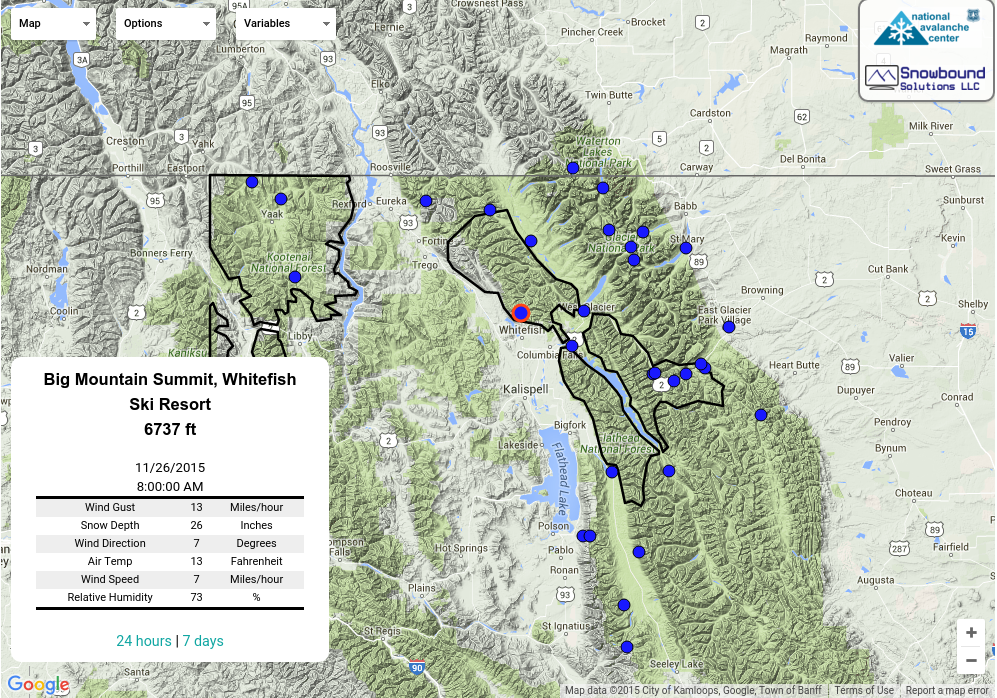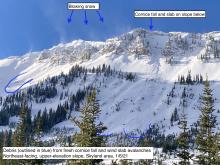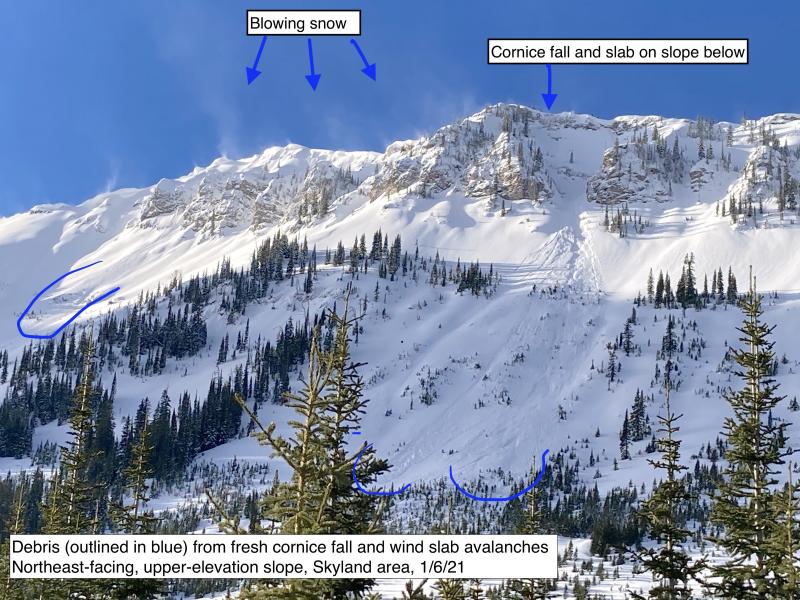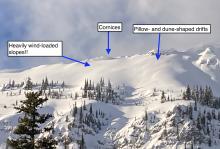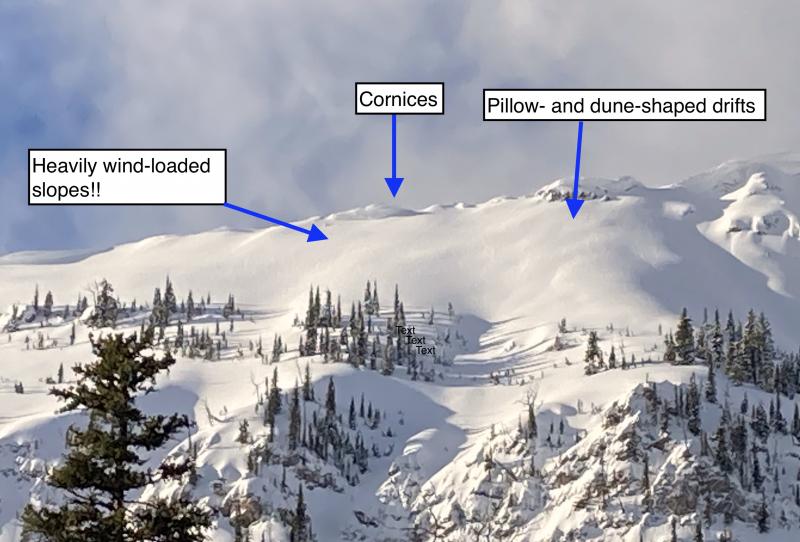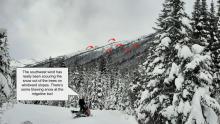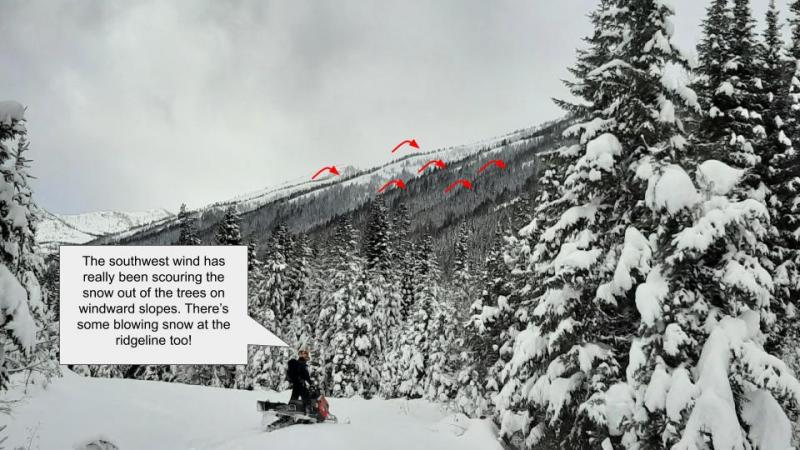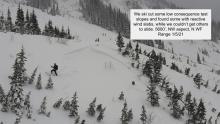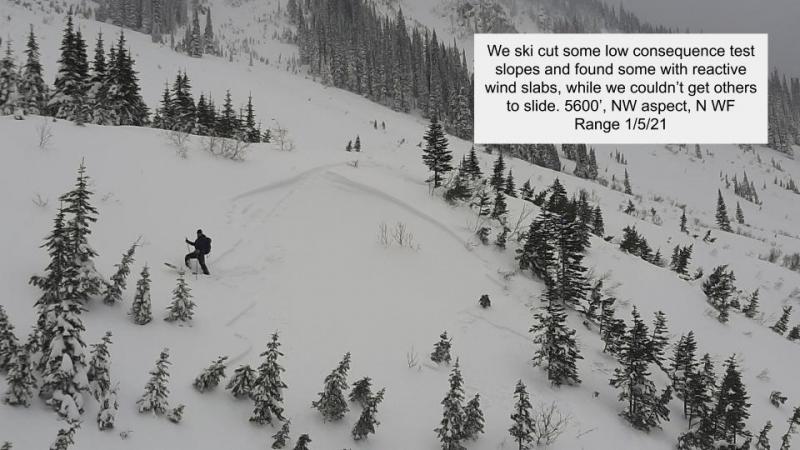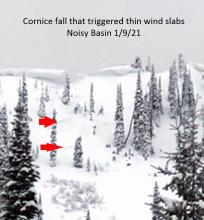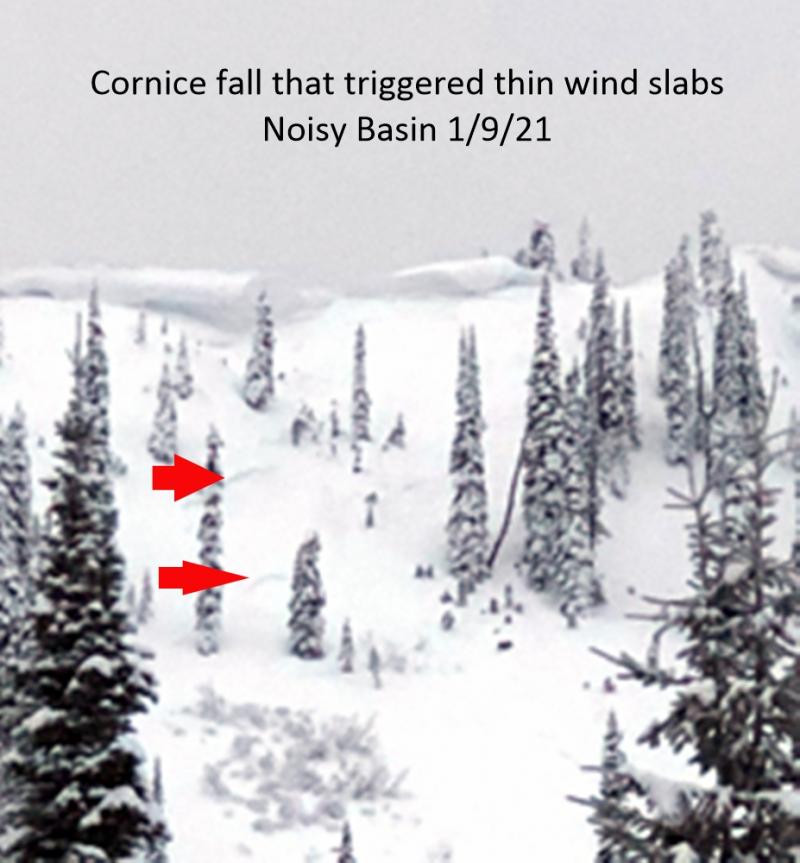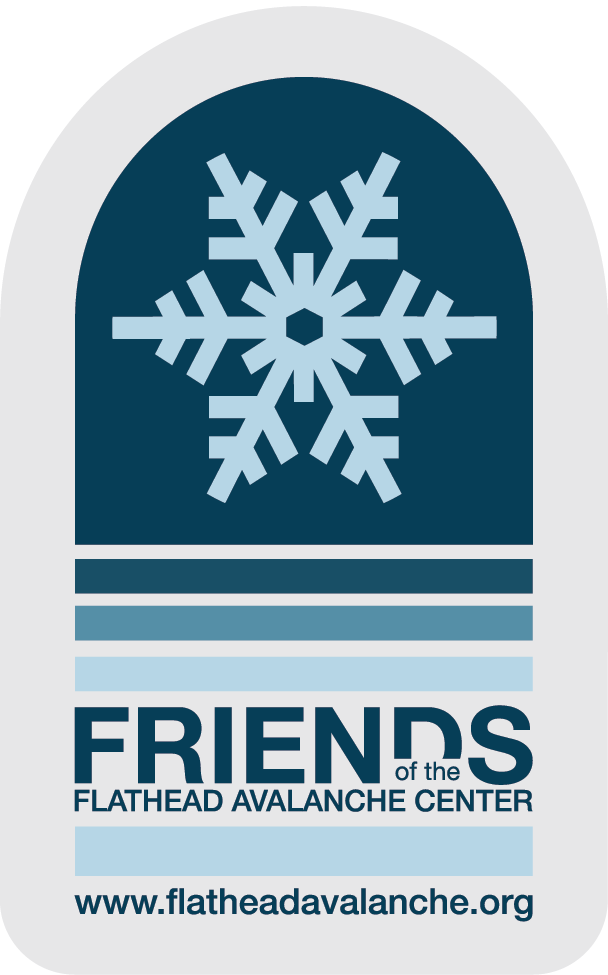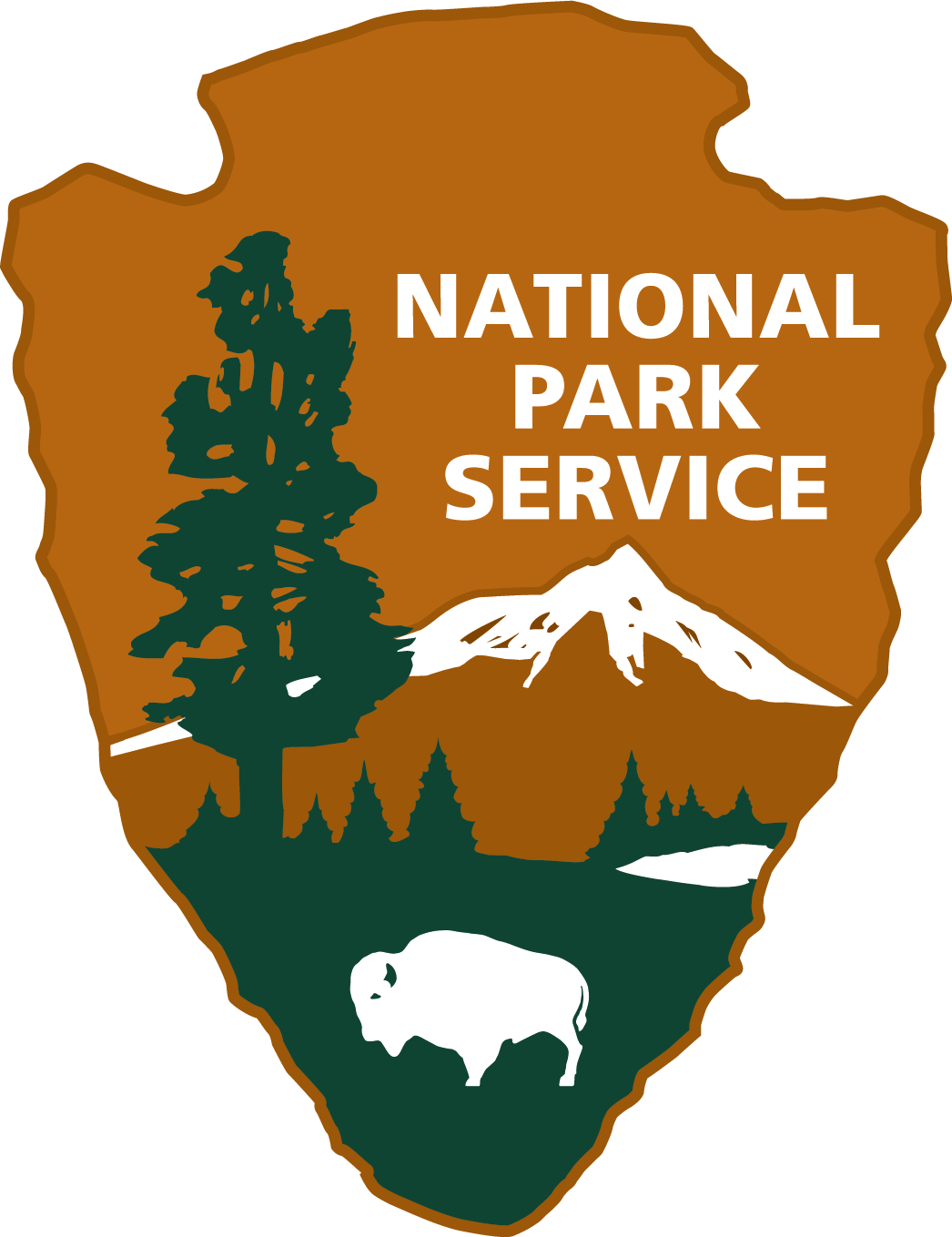| Sunday | Sunday Night | Monday | |
|---|---|---|---|
| Cloud Cover: | Cool and dry conditions with northerly winds. | Cold with west winds. | Warming and dry. |
| Temperatures: | 11-19 deg. F. | -3 to 7 deg. F. | 17-24 deg. F. |
| Wind Direction: | North-Northeast | West-Southwest | Southwest |
| Wind Speed: | 5 mph with gusts to 16 | 5 mph with gusts to 21 in the Flathead Range. | 9-21 mph with gusts to 28 in the Flathead Range. |
| Snowfall: | 0 in. | 0-2 in. | 0 in. |
| Snow Line: |
Whitefish Range
Swan Range
Flathead Range and Glacier National Park
How to read the forecast
New thin wind slabs formed yesterday and overnight on atypical aspects. Larger and more widespread wind slabs were formed earlier in the week on typical leeward aspects. The avalanche danger is MODERATE above 6000 feet. Human triggered avalanches are possible today on wind loaded slopes. Carefully evaluate all wind loaded terrain before committing to a slope. Have a safe and enjoyable Christmas Day!
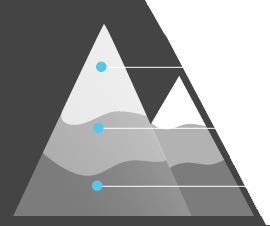
2. Moderate
?
Above 6500 ft.
1. Low
?
5000-6500 ft.
1. Low
?
3500-5000 ft.
- 1. Low
- 2. Moderate
- 3. Considerable
- 4. High
- 5. Extreme
-
Type ?
-
Aspect/Elevation ?

-
Likelihood ?CertainVery LikelyLikelyPossible
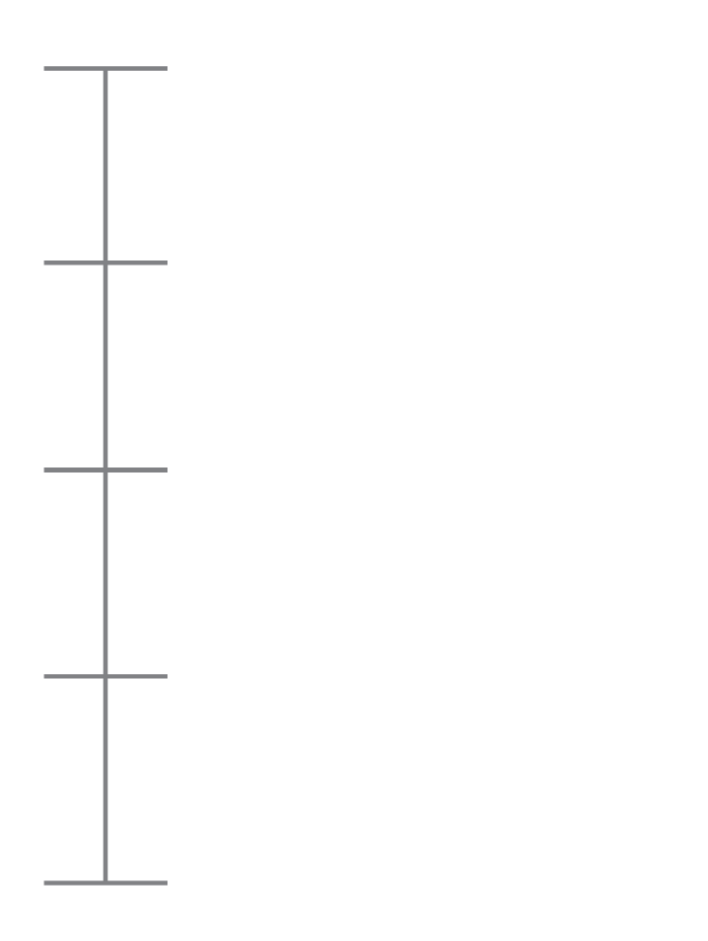 Unlikely
Unlikely -
Size ?HistoricVery LargeLargeSmall

Light to moderate northeasterly winds entered our area yesterday and drifted recent new snow onto atypical aspects (southeast, south, southwest and west). Thin wind slabs formed yesterday were deposited onto either previously wind scoured surfaces or on top of a thin layer of weak (new) snow. In favored exposed upper elevation locations these slabs could continue developing throughout today. These slabs may be identifiable by cracking or collapsing of the snowpack and the presence of smooth rounded pillows of snow. Earlier this week, moderate to strong winds combined with new relatively dense snow, formed wind slabs on typical leeward slopes at mid and upper elevations. These slabs have had a few days to gain strength and may not be quite so recognizable as the slabs that formed yesterday. However, these slabs are both more widespread and larger and therefore the consequences of triggering one of these is greater. In exposed upper elevation locations you may even encounter a few hard slabs formed earlier in the week. They will be supportable, feel hollow and "drummy" and should be avoided. All wind loaded slopes should be approached with caution before recreating on them.
Recent avalanche activity has been confined to the new snow/old snow interface with the new snow being essentially what has been deposited since last Monday. This new snow has gained strength but it is still important to assess the upper snowpack for potential weak layers like surface hoar and weak, faceted snow that formed prior to this week. Look for this weak interface 1-2+ feet from the surface and pay attention to obvious signs of instability. Also, in some locations, like John F. Stevens Canyon and approaching the Divide you may find weak (faceted) snow around crusts 1.5-3.5+ feet from the surface (video). The most common places to trigger these deeper slides are in steep, rocky terrain, and areas with a relatively shallow snowpack.
Join us at the Kalispell Brewing Company on Tuesday, December 27th to support a great cause by drinking delicious, locally-made beer. Kalispell Brewing will donate $1.00 per every beer sold to Friends of Flathead Avalanche Center (FOFAC) between 5:00 and 8:00 p.m. See you at the brewery!
Yesterday, skiers in the southern Whitefish Range reported some surface slab formation in open areas but they did not find this slab to be reactive. They did not find evidence of an obvious weak layer or strong slab within the top 2 feet of the snow surface. No other signs of instability were noted.
Friday: Guy traveled to Snowshed Mountain in the Flathead Range where he found entire slopes either scoured or wind loaded above 6800'. In his pit he found a variety of wind slabs and one thin faceted layer which was not reactive in his tests. Zack was in Noisy Basin in the Swan Range where he noted wind affected snow above 5000' and a thin breakable wind crust above 6000' on ridges and open slopes. His layer of concern was the weak snow at the old snow/new snow interface. Mark traveled to Peak 6996 in southern Glacier Park where he found a sun crust on steep low elevation southerly aspects and wind affected snow at all elevations. At mid elevations the newly formed wind slab sat on top of low density snow. In an upper elevation pit the basal layer consisted of weak faceted snow that sandwiched an ice mass.
BNSF Avalanche Safety was in the John F. Stevens Canyon Thursday and found variable conditions both on the surface and snowpack structure. They noted one audible collapse in the snowpack associated with recent windslab (observation). Whitefish Mountain Resort Ski Patrol reported minimal results using explosives for avalanche control.
Light snow tapered off on Christmas Eve leaving our area with an additional 1-6" of new snow over the past 24 hours. A weak arctic air mass is responsible for temperatures dropping throughout the day yesterday and the chilly temperatures this morning. Currently, mountain temperatures range from 0-11º F, and winds are out of the northeast at 5-15 mph with gusts from 9-17 mph. Today, temperatures will be cool and top out in the mid teens with light northerly winds and occasional moderate gusts. Temperatures will drop again tonight before warming closer to normal tomorrow.
| 0600 temperature: | 0-11 deg. F. |
| Max. temperature in the last 24 hours: | 14-30 deg. F. |
| Average wind direction during the last 24 hours: | Northeast |
| Average wind speed during the last 24 hours: | 4-25 mph |
| Maximum wind gust in the last 24 hours: | 25-31 mph |
| New snowfall in the last 24 hours: | 1-6 inches |
| Total snow depth: | 49-69 inches |
This advisory applies only to backcountry areas outside established ski area boundaries. This advisory describes general avalanche conditions and local variations always occur. This advisory expires at midnight on the posted day unless otherwise noted. The information in this advisory is provided by the USDA Forest Service who is solely responsible for its content.

